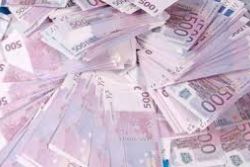- Business
- Childbirth & Education
- Legal Formalities
- Motoring
- Other
- Pensions & Benefits
- Property & Accommodation
- Taxes
- Airports and Airlines Spain
- Paramount Theme Park Murcia Spain
- Corvera International Airport Murcia Spain
- Join us for Tea on the Terrace
- When Expat Eyes Are Smiling
- Meet Wincham at The Homes, Gardens & Lifestyle Show, Calpe
- QROPS 2014
- Spain Increases IHT in Valencia & Murcia
- Removals to Spain v Exports from Spain
- The Charm of Seville
- Gibraltar Relations
- Retiro Park : Madrid
- Community Insurance in Spain
- Calendar Girls
- Considerations when Insuring your Boat in Spain
- QROPS – HMRC Introduces changes that create havoc in the market place
- QROPS – All Change From April 2012
- Liva & Laia : 15th November

The is hoping to ban the 500 note in a bid to stop criminals from dealing in cash, and high-denomination notes like the 500 make "black" money easier to handle.
In Spain, a common nickname for the 500 is the "Bin Laden," because everyone knows it exists, but nobody has ever seen one. And Spain, says the Guardian's Jennifer Rankin, is one of the countries behind the ban, partly thanks to a Chinese businessman Gao Ping, currently being prosecuted for laundering up to $335 million a year from his network of 4,000 Chinese bazaars, which sell plastic junk from almost every city street. When he was arrested, Ping had around EU12.5 Mln in his home, in cash, in 100, 200, and 500 bills.
The U.K., says Rankin, already stopped circulating the 500 note, on the grounds that it was "almost entirely for criminal purposes."
Even when dodgy cash is discovered, it's hard to tie it to a crime. Cash, unlike electronic transactions, leaves no paper trail.
"Our frustration from a law enforcement perspective is that [ ] in many jurisdictions it is impossible to provide sufficient evidence to satisfy judicial authorities of a link between suspicious cash detections and criminality," Europol's Jennifer MacLeod told the Guardian. In other words, the reason criminals still favor cash is because it is still the most anonymous and invisible way to transact business.
France has already banned cash transactions over 1,000, and Spain, too, limits large transactions. If you want to buy something like an iPad Pro tablet in Paris, you have to use a credit or debit card or you're breaking the law.
This ban on high-value cash transactions, though, has little to do with criminality, and everything to do with tax, and tracking what law-abiding citizens spend. If you're already carrying 1 million in 500 bills (which apparently fits nicely into a regular laptop case), then you're probably not worried that the international assassin you're about to pay off will report you to the cops for paying in cash. But for you and me, the policy makes it harder for us to live our legally conducted lives with any anonymity.
The policy makes it harder for us to live our legally conducted lives with any anonymity.
recommended Reading :
* 6 arrested in ICBC money laundering case ordered to jail
* Spain detains Ronaldo's Mum for carrying EU55K










